Need something to impress the neighbours at this summer's block party? Then look no further for the perfect desert! Here is a wonderful recipe submitted by Jerilyn Deschamps. Many thanks go out to her for this tasty recipe!
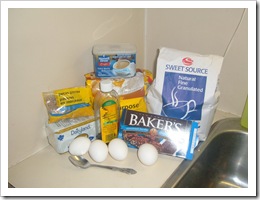 What you'll need:
4 squares Baker’s Unsweetened Chocolate
1 ¼ cups butter, divided
2 cups sugar
4 eggs
1 tsp vanilla
1 cup flour
¾ cup Maxwell House Café Suisse Mocha instant coffee mix, divided
1 cup pecans chopped
Frosting
3 tbsp hot milk
4 cups icing sugar
What do I do next?
What you'll need:
4 squares Baker’s Unsweetened Chocolate
1 ¼ cups butter, divided
2 cups sugar
4 eggs
1 tsp vanilla
1 cup flour
¾ cup Maxwell House Café Suisse Mocha instant coffee mix, divided
1 cup pecans chopped
Frosting
3 tbsp hot milk
4 cups icing sugar
What do I do next?
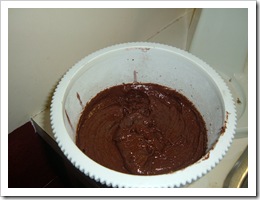 Line 13x9 inch baking pan with greased foil. Microwave chocolate and ¾ cup butter in large microwave bowl on medium for 2 minutes or until melted. Stir until chocolate is completely melted. Stir in sugar until well blended. Mix in eggs and vanilla, stir in flour, ½ cup coffee mix and pecans and spread into prepared pan.
Bake at 350 for 30 to 35 minutes or until toothpick inserted in centre comes out with fudgie crumbs. Do not over bake. Cool completely in pan and then cut into squares.
Frosting**
Dissolve remaining coffee mix in hot milk; beat in remaining butter until creamy. Gradually add icing sugar, beat on low speed until well blended. Let stand until frosting is spreading consistency, and then ice brownies.
Line 13x9 inch baking pan with greased foil. Microwave chocolate and ¾ cup butter in large microwave bowl on medium for 2 minutes or until melted. Stir until chocolate is completely melted. Stir in sugar until well blended. Mix in eggs and vanilla, stir in flour, ½ cup coffee mix and pecans and spread into prepared pan.
Bake at 350 for 30 to 35 minutes or until toothpick inserted in centre comes out with fudgie crumbs. Do not over bake. Cool completely in pan and then cut into squares.
Frosting**
Dissolve remaining coffee mix in hot milk; beat in remaining butter until creamy. Gradually add icing sugar, beat on low speed until well blended. Let stand until frosting is spreading consistency, and then ice brownies.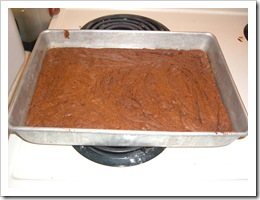 Tips
If using a glass pan reduce to 325. Sift icing sugar before measuring.
**NOTE: Jerilyn has asked me to let you all know that the frosting is very sweet and she usually does not make it with the brownies.
Do you have a recipe to share with us? Please email erincarrasco@gmail.com including pictures and instructions on how to make your favourite dishes! Please also indicate how you would like your name to appear on the posting! Happy baking!
Tips
If using a glass pan reduce to 325. Sift icing sugar before measuring.
**NOTE: Jerilyn has asked me to let you all know that the frosting is very sweet and she usually does not make it with the brownies.
Do you have a recipe to share with us? Please email erincarrasco@gmail.com including pictures and instructions on how to make your favourite dishes! Please also indicate how you would like your name to appear on the posting! Happy baking!
Mocha Brownies
 What you'll need:
4 squares Baker’s Unsweetened Chocolate
1 ¼ cups butter, divided
2 cups sugar
4 eggs
1 tsp vanilla
1 cup flour
¾ cup Maxwell House Café Suisse Mocha instant coffee mix, divided
1 cup pecans chopped
Frosting
3 tbsp hot milk
4 cups icing sugar
What do I do next?
What you'll need:
4 squares Baker’s Unsweetened Chocolate
1 ¼ cups butter, divided
2 cups sugar
4 eggs
1 tsp vanilla
1 cup flour
¾ cup Maxwell House Café Suisse Mocha instant coffee mix, divided
1 cup pecans chopped
Frosting
3 tbsp hot milk
4 cups icing sugar
What do I do next?
 Line 13x9 inch baking pan with greased foil. Microwave chocolate and ¾ cup butter in large microwave bowl on medium for 2 minutes or until melted. Stir until chocolate is completely melted. Stir in sugar until well blended. Mix in eggs and vanilla, stir in flour, ½ cup coffee mix and pecans and spread into prepared pan.
Bake at 350 for 30 to 35 minutes or until toothpick inserted in centre comes out with fudgie crumbs. Do not over bake. Cool completely in pan and then cut into squares.
Frosting**
Dissolve remaining coffee mix in hot milk; beat in remaining butter until creamy. Gradually add icing sugar, beat on low speed until well blended. Let stand until frosting is spreading consistency, and then ice brownies.
Line 13x9 inch baking pan with greased foil. Microwave chocolate and ¾ cup butter in large microwave bowl on medium for 2 minutes or until melted. Stir until chocolate is completely melted. Stir in sugar until well blended. Mix in eggs and vanilla, stir in flour, ½ cup coffee mix and pecans and spread into prepared pan.
Bake at 350 for 30 to 35 minutes or until toothpick inserted in centre comes out with fudgie crumbs. Do not over bake. Cool completely in pan and then cut into squares.
Frosting**
Dissolve remaining coffee mix in hot milk; beat in remaining butter until creamy. Gradually add icing sugar, beat on low speed until well blended. Let stand until frosting is spreading consistency, and then ice brownies. Tips
If using a glass pan reduce to 325. Sift icing sugar before measuring.
**NOTE: Jerilyn has asked me to let you all know that the frosting is very sweet and she usually does not make it with the brownies.
Do you have a recipe to share with us? Please email erincarrasco@gmail.com including pictures and instructions on how to make your favourite dishes! Please also indicate how you would like your name to appear on the posting! Happy baking!
Tips
If using a glass pan reduce to 325. Sift icing sugar before measuring.
**NOTE: Jerilyn has asked me to let you all know that the frosting is very sweet and she usually does not make it with the brownies.
Do you have a recipe to share with us? Please email erincarrasco@gmail.com including pictures and instructions on how to make your favourite dishes! Please also indicate how you would like your name to appear on the posting! Happy baking!
So yesterday my husband and I went rushing to the hospital to see the newest addition to our family! With a little twist.
 My sister had a fetal assessment at 36 weeks gestation and the ultrasound technician "showed" her it was a girl. Well folks it must have been the bum that she was shown because at 5:15 yesterday afternoon, my sister had a boy and not a girl!
After some serious back labour, a failed epidural (which they tried to administer at 10 cm's--why and how they did that blows my mind) and 10 hours later her second son, and third child came into this world. They named him Sebastian Tyrell, and I'm so biased but he's perfect! He was so alert when we went to see him!
So now they have to take all the clothes back that are pink; my sister didn't go too nuts with buying pink stuff until they had the ultrasound because up until a few weeks ago, they had no idea what they were having. And while you can put blue on a girl, you cannot put pink on a boy. I'm sure this is exactly why there are less and less ultrasound technicians revealing the gender, and to their credit, things are pretty squished around in there by that time!
So while his room is not pink, there are quite a few girly things in there that will have to be put away! It was amazing to think only 4 and a half months ago I was that person looking exhausted and in pain laying in that bed, while everyone cooed over my new son. I was happy to hold him while we were there and sooth him while he cried, but man I tell you I was happy to give him back to mom and dad when we left. And because of all of Dr. Karp's wonderful methods, I've been designated the baby calmer! I guess I'd better teach her quickly the 5 S's hey?
Well everyone enjoy your weekend!
My sister had a fetal assessment at 36 weeks gestation and the ultrasound technician "showed" her it was a girl. Well folks it must have been the bum that she was shown because at 5:15 yesterday afternoon, my sister had a boy and not a girl!
After some serious back labour, a failed epidural (which they tried to administer at 10 cm's--why and how they did that blows my mind) and 10 hours later her second son, and third child came into this world. They named him Sebastian Tyrell, and I'm so biased but he's perfect! He was so alert when we went to see him!
So now they have to take all the clothes back that are pink; my sister didn't go too nuts with buying pink stuff until they had the ultrasound because up until a few weeks ago, they had no idea what they were having. And while you can put blue on a girl, you cannot put pink on a boy. I'm sure this is exactly why there are less and less ultrasound technicians revealing the gender, and to their credit, things are pretty squished around in there by that time!
So while his room is not pink, there are quite a few girly things in there that will have to be put away! It was amazing to think only 4 and a half months ago I was that person looking exhausted and in pain laying in that bed, while everyone cooed over my new son. I was happy to hold him while we were there and sooth him while he cried, but man I tell you I was happy to give him back to mom and dad when we left. And because of all of Dr. Karp's wonderful methods, I've been designated the baby calmer! I guess I'd better teach her quickly the 5 S's hey?
Well everyone enjoy your weekend!
 My sister had a fetal assessment at 36 weeks gestation and the ultrasound technician "showed" her it was a girl. Well folks it must have been the bum that she was shown because at 5:15 yesterday afternoon, my sister had a boy and not a girl!
After some serious back labour, a failed epidural (which they tried to administer at 10 cm's--why and how they did that blows my mind) and 10 hours later her second son, and third child came into this world. They named him Sebastian Tyrell, and I'm so biased but he's perfect! He was so alert when we went to see him!
So now they have to take all the clothes back that are pink; my sister didn't go too nuts with buying pink stuff until they had the ultrasound because up until a few weeks ago, they had no idea what they were having. And while you can put blue on a girl, you cannot put pink on a boy. I'm sure this is exactly why there are less and less ultrasound technicians revealing the gender, and to their credit, things are pretty squished around in there by that time!
So while his room is not pink, there are quite a few girly things in there that will have to be put away! It was amazing to think only 4 and a half months ago I was that person looking exhausted and in pain laying in that bed, while everyone cooed over my new son. I was happy to hold him while we were there and sooth him while he cried, but man I tell you I was happy to give him back to mom and dad when we left. And because of all of Dr. Karp's wonderful methods, I've been designated the baby calmer! I guess I'd better teach her quickly the 5 S's hey?
Well everyone enjoy your weekend!
My sister had a fetal assessment at 36 weeks gestation and the ultrasound technician "showed" her it was a girl. Well folks it must have been the bum that she was shown because at 5:15 yesterday afternoon, my sister had a boy and not a girl!
After some serious back labour, a failed epidural (which they tried to administer at 10 cm's--why and how they did that blows my mind) and 10 hours later her second son, and third child came into this world. They named him Sebastian Tyrell, and I'm so biased but he's perfect! He was so alert when we went to see him!
So now they have to take all the clothes back that are pink; my sister didn't go too nuts with buying pink stuff until they had the ultrasound because up until a few weeks ago, they had no idea what they were having. And while you can put blue on a girl, you cannot put pink on a boy. I'm sure this is exactly why there are less and less ultrasound technicians revealing the gender, and to their credit, things are pretty squished around in there by that time!
So while his room is not pink, there are quite a few girly things in there that will have to be put away! It was amazing to think only 4 and a half months ago I was that person looking exhausted and in pain laying in that bed, while everyone cooed over my new son. I was happy to hold him while we were there and sooth him while he cried, but man I tell you I was happy to give him back to mom and dad when we left. And because of all of Dr. Karp's wonderful methods, I've been designated the baby calmer! I guess I'd better teach her quickly the 5 S's hey?
Well everyone enjoy your weekend!
There are a billion and one websites out there for the newly pregnant woman, how to choose? Some are fantastic but most are littered with advertising. While it's almost impossible to find a website with advertising, the following are some of my favourite's for different reasons--and yes they all have advertising, some is a little more annoying then other's but I digress.
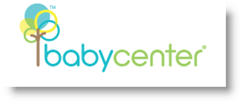 Why I like it: Baby Center has different "center's" for different countries all over the world. The American version has by far the most features and most in depth articles. It also has different features like polls and quizzes along with a "baby center store" that you can purchase things for your baby--Only available to US residents)
Why I like it: Baby Center has different "center's" for different countries all over the world. The American version has by far the most features and most in depth articles. It also has different features like polls and quizzes along with a "baby center store" that you can purchase things for your baby--Only available to US residents)
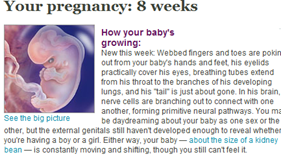 I like the weekly emails you can get about your newly growing babe inside you! It tells you (and shows you) your baby is the size of a "lemon" this week and these vital organs are growing! I loved getting these email every week! These are available from the Canadian Site of Baby Center but they are not as in depth as the American ones. They have great message boards but I found they were too quick for me to keep up with. While I was still working during my pregnancy (yes--it's true most pregnant women go online to scour the Internet for stuff about their babies--and completely zone out of some of their at work responsibilities) I found it hard to keep up with all of the gossip and news and tips from over 600 active (and who knows how many inactive) poster's. Which leads me to why I like the next site!
I like the weekly emails you can get about your newly growing babe inside you! It tells you (and shows you) your baby is the size of a "lemon" this week and these vital organs are growing! I loved getting these email every week! These are available from the Canadian Site of Baby Center but they are not as in depth as the American ones. They have great message boards but I found they were too quick for me to keep up with. While I was still working during my pregnancy (yes--it's true most pregnant women go online to scour the Internet for stuff about their babies--and completely zone out of some of their at work responsibilities) I found it hard to keep up with all of the gossip and news and tips from over 600 active (and who knows how many inactive) poster's. Which leads me to why I like the next site!
 Why I like it: Well it is Canadian. The only problem with this site is that it get's most of it's articles from the UK site--including stats on health issues. So some of the lingo is heavily English (UK). So in North America Pants are things like jeans, slacks etc. and in the UK they're underwear. Diaper's are Nappies and other little subtleties. They offer the weekly emails about your growing baby--but I found them a little less informative then the American site.
Why I like it: Well it is Canadian. The only problem with this site is that it get's most of it's articles from the UK site--including stats on health issues. So some of the lingo is heavily English (UK). So in North America Pants are things like jeans, slacks etc. and in the UK they're underwear. Diaper's are Nappies and other little subtleties. They offer the weekly emails about your growing baby--but I found them a little less informative then the American site.
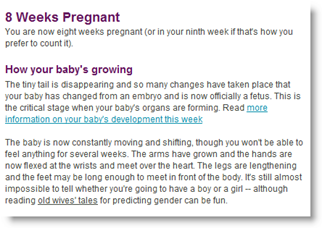 One bonus the Canadian site offers over the US site is that when you log onto their site the first page is the page that tells you how far along you are. The US site used to do that but now comes up with advertisements for their store and a whole whack of other things like articles, polls, quizzes. It is just too busy for me.
The best thing about the Canadian site is their message boards! I found so much support by joining my "birth club" for all mommies expecting the same month as me. While you all have the same questions, you may not all know all the right answers. The thing that made our month so successful was that there was no such thing as TMI (too much information), and we were able to know that if someone felt it, most of us were going through it!
One bonus the Canadian site offers over the US site is that when you log onto their site the first page is the page that tells you how far along you are. The US site used to do that but now comes up with advertisements for their store and a whole whack of other things like articles, polls, quizzes. It is just too busy for me.
The best thing about the Canadian site is their message boards! I found so much support by joining my "birth club" for all mommies expecting the same month as me. While you all have the same questions, you may not all know all the right answers. The thing that made our month so successful was that there was no such thing as TMI (too much information), and we were able to know that if someone felt it, most of us were going through it!
 Why I like it: While I wasn't the most fit person before my pregnancy, your eating habits most likely change and I became more health conscious during my pregnancy. This site has amazing links to really neat articles as well as more tips for each stage of the game! Check it out for safe work out's while you're pregnant. It also has exercises that help tone all those important muscles for labour and after baby is born! They also have a section on baby week by week and how your body is changing in those 40 weeks!
Why I like it: While I wasn't the most fit person before my pregnancy, your eating habits most likely change and I became more health conscious during my pregnancy. This site has amazing links to really neat articles as well as more tips for each stage of the game! Check it out for safe work out's while you're pregnant. It also has exercises that help tone all those important muscles for labour and after baby is born! They also have a section on baby week by week and how your body is changing in those 40 weeks!
 Why I like it: Ok this is by far the most "tabloid" website. It has the most "quizzes" and has some numerology to find out what your child's name might mean in terms of personality. What I liked about it was that it was fun! It also had a daily calendar that you could look up what stage you were at and it would have suggestions as to what to be interested in! It also gives you a time frame for when you should look into prenatal care, and informs you about perineal massage---I don't think they should have dubbed it a massage.
Why I like it: Ok this is by far the most "tabloid" website. It has the most "quizzes" and has some numerology to find out what your child's name might mean in terms of personality. What I liked about it was that it was fun! It also had a daily calendar that you could look up what stage you were at and it would have suggestions as to what to be interested in! It also gives you a time frame for when you should look into prenatal care, and informs you about perineal massage---I don't think they should have dubbed it a massage.
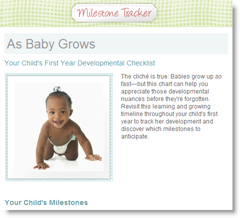 You can also look up your baby names that you have picked out to see what they mean and save them to a list!
Now that I've had my little one it has a very neat milestone tracker that you can track your child's development over the months to see if he/she is hitting milestone goals! But other then that it has fun things like "is it a boy or girl" old wives tales are they true? Find out by clicking here to test it out!
You can also look up your baby names that you have picked out to see what they mean and save them to a list!
Now that I've had my little one it has a very neat milestone tracker that you can track your child's development over the months to see if he/she is hitting milestone goals! But other then that it has fun things like "is it a boy or girl" old wives tales are they true? Find out by clicking here to test it out!
 Pregnancy is a hard enough time as it is, with all the things that you are forced to worry about it's nice to have an "official" source to see what's safe and what's not. If you've heard that Red Raspberry leaf is safe, is it? Check out the site if you have any questions about natural remedies or herbs that you need scientific backing for. They also have a Pregnancy Center for all things Pregnancy related. Click here to check it out!
Pregnancy is a hard enough time as it is, with all the things that you are forced to worry about it's nice to have an "official" source to see what's safe and what's not. If you've heard that Red Raspberry leaf is safe, is it? Check out the site if you have any questions about natural remedies or herbs that you need scientific backing for. They also have a Pregnancy Center for all things Pregnancy related. Click here to check it out!
1) BabyCenter.com
 Why I like it: Baby Center has different "center's" for different countries all over the world. The American version has by far the most features and most in depth articles. It also has different features like polls and quizzes along with a "baby center store" that you can purchase things for your baby--Only available to US residents)
Why I like it: Baby Center has different "center's" for different countries all over the world. The American version has by far the most features and most in depth articles. It also has different features like polls and quizzes along with a "baby center store" that you can purchase things for your baby--Only available to US residents)
 I like the weekly emails you can get about your newly growing babe inside you! It tells you (and shows you) your baby is the size of a "lemon" this week and these vital organs are growing! I loved getting these email every week! These are available from the Canadian Site of Baby Center but they are not as in depth as the American ones. They have great message boards but I found they were too quick for me to keep up with. While I was still working during my pregnancy (yes--it's true most pregnant women go online to scour the Internet for stuff about their babies--and completely zone out of some of their at work responsibilities) I found it hard to keep up with all of the gossip and news and tips from over 600 active (and who knows how many inactive) poster's. Which leads me to why I like the next site!
I like the weekly emails you can get about your newly growing babe inside you! It tells you (and shows you) your baby is the size of a "lemon" this week and these vital organs are growing! I loved getting these email every week! These are available from the Canadian Site of Baby Center but they are not as in depth as the American ones. They have great message boards but I found they were too quick for me to keep up with. While I was still working during my pregnancy (yes--it's true most pregnant women go online to scour the Internet for stuff about their babies--and completely zone out of some of their at work responsibilities) I found it hard to keep up with all of the gossip and news and tips from over 600 active (and who knows how many inactive) poster's. Which leads me to why I like the next site!
2) BabyCenter.ca
 Why I like it: Well it is Canadian. The only problem with this site is that it get's most of it's articles from the UK site--including stats on health issues. So some of the lingo is heavily English (UK). So in North America Pants are things like jeans, slacks etc. and in the UK they're underwear. Diaper's are Nappies and other little subtleties. They offer the weekly emails about your growing baby--but I found them a little less informative then the American site.
Why I like it: Well it is Canadian. The only problem with this site is that it get's most of it's articles from the UK site--including stats on health issues. So some of the lingo is heavily English (UK). So in North America Pants are things like jeans, slacks etc. and in the UK they're underwear. Diaper's are Nappies and other little subtleties. They offer the weekly emails about your growing baby--but I found them a little less informative then the American site.
 One bonus the Canadian site offers over the US site is that when you log onto their site the first page is the page that tells you how far along you are. The US site used to do that but now comes up with advertisements for their store and a whole whack of other things like articles, polls, quizzes. It is just too busy for me.
The best thing about the Canadian site is their message boards! I found so much support by joining my "birth club" for all mommies expecting the same month as me. While you all have the same questions, you may not all know all the right answers. The thing that made our month so successful was that there was no such thing as TMI (too much information), and we were able to know that if someone felt it, most of us were going through it!
One bonus the Canadian site offers over the US site is that when you log onto their site the first page is the page that tells you how far along you are. The US site used to do that but now comes up with advertisements for their store and a whole whack of other things like articles, polls, quizzes. It is just too busy for me.
The best thing about the Canadian site is their message boards! I found so much support by joining my "birth club" for all mommies expecting the same month as me. While you all have the same questions, you may not all know all the right answers. The thing that made our month so successful was that there was no such thing as TMI (too much information), and we were able to know that if someone felt it, most of us were going through it!
3) FitPregnancy.com
 Why I like it: While I wasn't the most fit person before my pregnancy, your eating habits most likely change and I became more health conscious during my pregnancy. This site has amazing links to really neat articles as well as more tips for each stage of the game! Check it out for safe work out's while you're pregnant. It also has exercises that help tone all those important muscles for labour and after baby is born! They also have a section on baby week by week and how your body is changing in those 40 weeks!
Why I like it: While I wasn't the most fit person before my pregnancy, your eating habits most likely change and I became more health conscious during my pregnancy. This site has amazing links to really neat articles as well as more tips for each stage of the game! Check it out for safe work out's while you're pregnant. It also has exercises that help tone all those important muscles for labour and after baby is born! They also have a section on baby week by week and how your body is changing in those 40 weeks!
4) BabyZone.com
 Why I like it: Ok this is by far the most "tabloid" website. It has the most "quizzes" and has some numerology to find out what your child's name might mean in terms of personality. What I liked about it was that it was fun! It also had a daily calendar that you could look up what stage you were at and it would have suggestions as to what to be interested in! It also gives you a time frame for when you should look into prenatal care, and informs you about perineal massage---I don't think they should have dubbed it a massage.
Why I like it: Ok this is by far the most "tabloid" website. It has the most "quizzes" and has some numerology to find out what your child's name might mean in terms of personality. What I liked about it was that it was fun! It also had a daily calendar that you could look up what stage you were at and it would have suggestions as to what to be interested in! It also gives you a time frame for when you should look into prenatal care, and informs you about perineal massage---I don't think they should have dubbed it a massage.
 You can also look up your baby names that you have picked out to see what they mean and save them to a list!
Now that I've had my little one it has a very neat milestone tracker that you can track your child's development over the months to see if he/she is hitting milestone goals! But other then that it has fun things like "is it a boy or girl" old wives tales are they true? Find out by clicking here to test it out!
You can also look up your baby names that you have picked out to see what they mean and save them to a list!
Now that I've had my little one it has a very neat milestone tracker that you can track your child's development over the months to see if he/she is hitting milestone goals! But other then that it has fun things like "is it a boy or girl" old wives tales are they true? Find out by clicking here to test it out!
5)MayoClinic.com
 Pregnancy is a hard enough time as it is, with all the things that you are forced to worry about it's nice to have an "official" source to see what's safe and what's not. If you've heard that Red Raspberry leaf is safe, is it? Check out the site if you have any questions about natural remedies or herbs that you need scientific backing for. They also have a Pregnancy Center for all things Pregnancy related. Click here to check it out!
Pregnancy is a hard enough time as it is, with all the things that you are forced to worry about it's nice to have an "official" source to see what's safe and what's not. If you've heard that Red Raspberry leaf is safe, is it? Check out the site if you have any questions about natural remedies or herbs that you need scientific backing for. They also have a Pregnancy Center for all things Pregnancy related. Click here to check it out!
The bottom line
A close call for my top 5 was this site as a fun site. From Justmommies.com comes a Labour Prediction Quiz! This is a purely "fun" quiz designed to predict how long your labour would be, how early, and the weight of your babe! While it was grossly off for me for the length of my labour and when I would go into labour, the size was about right! One out of three isn't bad right? I guess they didn't want to scare me with a 23 hour labour! I found these sites fantastic as a resource and still do now that I'm a mom! I'm still friends with many of the women I got to know online through the message boards, and with the invention of Facebook we've all grown quite close even though we live all over the country. My pregnancy would not have been the same without these ladies and their wonderful knowledge has made me a well informed person that is not in the dark. Often when you are pregnant you are going through so many emotional things as well as crazy bodily functions that it helps just knowing people understand what you are going through. Your support group does not have to be online however, but make sure that you have an outlet. Pregnancy while amazing is a hard time. Find some people or someone that you trust and get out all of your pent up emotions. No one expects you to be perfect, and some times you can have some pretty conflicting and confusing feelings. Just know you are NOT ever alone in these!What is Cradle Cap?
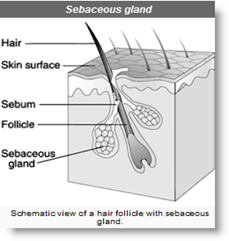 Cradle cap is a crusting and scaling rash found on the scalps of many healthy babies. This often happens because of excess hormones that get passed to baby from mom (from the placenta just before birth). The sebaceous glands(see picture) in their skin are hyperactivated because of these hormones. These glands pump out a greasy substance that keeps the old skin cells attached as it dries.
You might notice the same condition around your baby's ears or eyebrows, or even in his armpits and other creases. When it's not on his/her scalp, it's called seborrheic dermatitis.
Cradle cap is a crusting and scaling rash found on the scalps of many healthy babies. This often happens because of excess hormones that get passed to baby from mom (from the placenta just before birth). The sebaceous glands(see picture) in their skin are hyperactivated because of these hormones. These glands pump out a greasy substance that keeps the old skin cells attached as it dries.
You might notice the same condition around your baby's ears or eyebrows, or even in his armpits and other creases. When it's not on his/her scalp, it's called seborrheic dermatitis.
When does it appear?
Cradle cap can occur in any baby, and most commonly begins sometime in the first 3 months. I think my son had it pretty early. (within the first couple of weeks)What are the symptoms?
I'm going to be non technical, baby's head kind of looks like it has scales on it. It's dry and crusty or flaky. But it can get pretty bad and sometimes the crusty flakes can weep a bit. Yeah doesn't sound too yummy does it! But generally it doesn't bother your babe, if it get's pretty bad it may become itchy. You can always talk to your doctor about it if you are concerned!![cradle cap[1]](http://www.mombiefitness.com/WindowsLiveWriter/cradle+cap%5B1%5D_thumb.jpg) If it get's red or inflamed your pharmacist may be able to suggest an over the counter cortisone cream.
If it get's red or inflamed your pharmacist may be able to suggest an over the counter cortisone cream.
Is it contagious?
No.How long does it last?
Usually it disappears between 8 and 12 months, if it does persist talk to your pediatrician.Is there anything I can do?
Yes! Most of the websites recommend washing with shampoo more frequently to get rid of the oil that builds up and holds the dried skin on. But to me it doesn't make sense to shampoo the crap out of dry skin! So I was reading up on various things to do for dry skin and I came across something that worked wonders for my son! (That's not his head in the above mentioned picture by the way---but it looked pretty similar)1)Olive Oil or Almond Oil
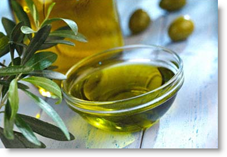 At first I thought I was just supposed to leave it on, and bush his hair and shampoo the next day. After reading up on this, you aren't supposed to leave it on for more then 30 minutes, because it can actually make the condition worse--remember it's caused by excess amounts of oil trapping the dead skin onto baby's head. So I tried to brush it off, but not much dead skin came off. The oil is suppose to loosen the scales, and then magically they are suppose to be "brushed' away. Well it didn't work, and I hate the smell of olive oil.
At first I thought I was just supposed to leave it on, and bush his hair and shampoo the next day. After reading up on this, you aren't supposed to leave it on for more then 30 minutes, because it can actually make the condition worse--remember it's caused by excess amounts of oil trapping the dead skin onto baby's head. So I tried to brush it off, but not much dead skin came off. The oil is suppose to loosen the scales, and then magically they are suppose to be "brushed' away. Well it didn't work, and I hate the smell of olive oil.
2) Avocado
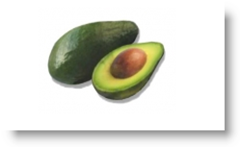 In ancient times this was used as a moisturizer (very high in oils), so I thought what the hay, I'll try it! So I picked up a ripe one (firm but a little mushy) and cut it in half, and mushed it with a fork.
So I had help with this because it's messy! I took my mushed up paste (my son looked more interested in eating it) and spread it on his head--he was NOT pleased when I put this pasty cold stuff on his head. So (after I washed my hands and my husband held him awkwardly--trying not to get it everywhere) I proceeded to cover his head with a cap (a little beanie one)--if you are going to do this I suggest using a cap you don't mind getting dirty. I waited 20 minutes and then gave him his nightly bath.
It left a green hue on his head (where the dead skin was) and I took a toothbrush to his head--god doesn't that sound evil? This probably made all the difference. As long as you are careful about how hard you press, the bristles are so much stronger then the baby brushes, that it actually got all the dead skin off! He didn't seem to mind either, so I knew I wasn't hurting him. All in all a huge cosmetic success!
In ancient times this was used as a moisturizer (very high in oils), so I thought what the hay, I'll try it! So I picked up a ripe one (firm but a little mushy) and cut it in half, and mushed it with a fork.
So I had help with this because it's messy! I took my mushed up paste (my son looked more interested in eating it) and spread it on his head--he was NOT pleased when I put this pasty cold stuff on his head. So (after I washed my hands and my husband held him awkwardly--trying not to get it everywhere) I proceeded to cover his head with a cap (a little beanie one)--if you are going to do this I suggest using a cap you don't mind getting dirty. I waited 20 minutes and then gave him his nightly bath.
It left a green hue on his head (where the dead skin was) and I took a toothbrush to his head--god doesn't that sound evil? This probably made all the difference. As long as you are careful about how hard you press, the bristles are so much stronger then the baby brushes, that it actually got all the dead skin off! He didn't seem to mind either, so I knew I wasn't hurting him. All in all a huge cosmetic success!
The bottom line
_thumb.jpg) Some people actually use avocado as a deep treatment conditioner, so I was not completely off my rocker when I decided to try this. You can actually use this on your skin too if you have moisture issues. For us the Avocado worked better then the Olive oil, and I would do it again in a heart beat. One thing they do suggest is to brush your child's head after his/her bath to make sure you get the dead skin off, so maybe investing in another toothbrush for their head isn't such a bad idea!
I'm sure when my son get's older he'll kill me for posting this, but for now I'm still the mom!
Some people actually use avocado as a deep treatment conditioner, so I was not completely off my rocker when I decided to try this. You can actually use this on your skin too if you have moisture issues. For us the Avocado worked better then the Olive oil, and I would do it again in a heart beat. One thing they do suggest is to brush your child's head after his/her bath to make sure you get the dead skin off, so maybe investing in another toothbrush for their head isn't such a bad idea!
I'm sure when my son get's older he'll kill me for posting this, but for now I'm still the mom!
Is your baby destroying your boobs with their painful grip and sharp nails? Then there may be an answer for you to entertain them. A Nursing necklace is a fashionable piece of jewelry designed to "entertain" your babe while you nurse them.
Around 3-4 months babies become more aware of their surroundings and if you are breastfeeding, that means your boobs ladies. So while they're chubby little hands are so cute, they're quite another thing when they tear your boobs to shreds!
I came across this website when my son was a little over 2 months, and was just starting to explore with his hands. I decided that I would try these necklaces out and see if they would do the trick to keep his focus at the boob but not on my boob! Also babies are detracted by new sounds and sites, these are supposed to keep their attention to the task at hand!
Laughing Starfish Jewelry
I found this neat site a few months ago and I have since ordered two necklaces. The woman who makes these necklaces is a stay at home mom (SAHM) which I always encourage others to support. She does amazing work, and I personally think that the 30$ (average cost) is not too much to pay for one necklace. Price ranges from (18.00-45.00$ USD) for necklaces and as low as 8.00$USD for earrings. Shipping isn't very much cash either! Check out her shipping rates, I think I paid something like 7$ which is fantastic in my books!
Below is just a sample of her work:
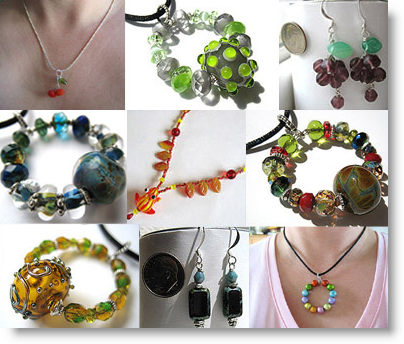 Please visit her website for more selection. She makes necklaces, earrings, bracelets and matching sets! She has pictures of all the things you could possibly buy.
Please visit her website for more selection. She makes necklaces, earrings, bracelets and matching sets! She has pictures of all the things you could possibly buy.
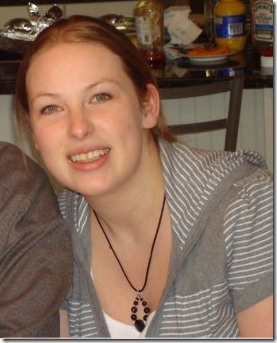 I ordered two necklaces, I ordered the ones that I thought I would enjoy wearing. I would definitely order more things from her! They came very quickly (as an international order, I got my shipment within two to three weeks). The envelope came with stickers all over it, and each necklace came in a little pouch so that if I wanted to gift these purchases I could have done so. I kept both but think that these necklaces are fashionable and functional that I would definitely gift them for any expectant mom. Even if you don't use them to distract your babe from destroying your boobs, or you child is disinterested, they're still beautiful jewelry that you can actually wear out!
One of them was very long (as I ordered two different lengths on purpose) but I tied knots in the back of the necklace to keep them in place and higher up (I'm not a very tall person).
My son isn't really interested in them as of yet, but I wear them out anyways. One of her points on her site is that children like the look of "real objects" versus the fake alternative. She gives the example of your car keys versus the toy ones, which one does your child prefer? The real ones! It's the same deal with the necklace.
I ordered two necklaces, I ordered the ones that I thought I would enjoy wearing. I would definitely order more things from her! They came very quickly (as an international order, I got my shipment within two to three weeks). The envelope came with stickers all over it, and each necklace came in a little pouch so that if I wanted to gift these purchases I could have done so. I kept both but think that these necklaces are fashionable and functional that I would definitely gift them for any expectant mom. Even if you don't use them to distract your babe from destroying your boobs, or you child is disinterested, they're still beautiful jewelry that you can actually wear out!
One of them was very long (as I ordered two different lengths on purpose) but I tied knots in the back of the necklace to keep them in place and higher up (I'm not a very tall person).
My son isn't really interested in them as of yet, but I wear them out anyways. One of her points on her site is that children like the look of "real objects" versus the fake alternative. She gives the example of your car keys versus the toy ones, which one does your child prefer? The real ones! It's the same deal with the necklace.
Laughing Starfish Jewelry 
I found this neat site a few months ago and I have since ordered two necklaces. The woman who makes these necklaces is a stay at home mom (SAHM) which I always encourage others to support. She does amazing work, and I personally think that the 30$ (average cost) is not too much to pay for one necklace. Price ranges from (18.00-45.00$ USD) for necklaces and as low as 8.00$USD for earrings. Shipping isn't very much cash either! Check out her shipping rates, I think I paid something like 7$ which is fantastic in my books!
Below is just a sample of her work:
 Please visit her website for more selection. She makes necklaces, earrings, bracelets and matching sets! She has pictures of all the things you could possibly buy.
Please visit her website for more selection. She makes necklaces, earrings, bracelets and matching sets! She has pictures of all the things you could possibly buy.
So what is the difference between a regular necklace and a nursing necklace?
There isn't anything that really differentiates regular necklaces from these besides their ability to sustain a lot of grabbing! Babies love to grab our jewels around our necks! These necklaces have durable threads that allow your child to pull every which way and not shatter your precious jewels. Some necklaces that you buy as nursing necklaces don't seem to have the mom in mind, but these necklaces are beautiful and functional. She does caution that they are not teething rings, and you should never let your child bite on them! That being said, you can get adjustable lengths (customizable at ordering time) of string depending on how long you want the cord of the necklace. This allows for you to make them longer or shorter depending on your child's reach.My experience:
 I ordered two necklaces, I ordered the ones that I thought I would enjoy wearing. I would definitely order more things from her! They came very quickly (as an international order, I got my shipment within two to three weeks). The envelope came with stickers all over it, and each necklace came in a little pouch so that if I wanted to gift these purchases I could have done so. I kept both but think that these necklaces are fashionable and functional that I would definitely gift them for any expectant mom. Even if you don't use them to distract your babe from destroying your boobs, or you child is disinterested, they're still beautiful jewelry that you can actually wear out!
One of them was very long (as I ordered two different lengths on purpose) but I tied knots in the back of the necklace to keep them in place and higher up (I'm not a very tall person).
My son isn't really interested in them as of yet, but I wear them out anyways. One of her points on her site is that children like the look of "real objects" versus the fake alternative. She gives the example of your car keys versus the toy ones, which one does your child prefer? The real ones! It's the same deal with the necklace.
I ordered two necklaces, I ordered the ones that I thought I would enjoy wearing. I would definitely order more things from her! They came very quickly (as an international order, I got my shipment within two to three weeks). The envelope came with stickers all over it, and each necklace came in a little pouch so that if I wanted to gift these purchases I could have done so. I kept both but think that these necklaces are fashionable and functional that I would definitely gift them for any expectant mom. Even if you don't use them to distract your babe from destroying your boobs, or you child is disinterested, they're still beautiful jewelry that you can actually wear out!
One of them was very long (as I ordered two different lengths on purpose) but I tied knots in the back of the necklace to keep them in place and higher up (I'm not a very tall person).
My son isn't really interested in them as of yet, but I wear them out anyways. One of her points on her site is that children like the look of "real objects" versus the fake alternative. She gives the example of your car keys versus the toy ones, which one does your child prefer? The real ones! It's the same deal with the necklace.
The bottom line
I'm just happy to know that if my son pulls on these necklaces I’m not scared of him breaking them! I see him release his "super strength" grip off of people's delicate necklaces and I don't have to worry about that with my fashionable ones! All in all a great experience. I can't guarantee your child will be interested in them, but if you get one that you actually like wearing, the sky's the limit!So I'm officially pregnant, what can I eat?
Ok, there is bound to controversy about what you can and can't eat. So if you disagree with me, that's your choice. These are just some recommendations to some women who choose to listen.10 Don't's
1) Sushi
Some types of sushi, such as California rolls (which contain steamed crab) and cooked eel, are fine to eat while you're pregnant. But it's best to avoid eating the kinds that contain raw seafood, such as tuna. Fresh, raw seafood is potentially risky because it can contain parasites such as tapeworm, which, if they grow large enough, could rob your body of nutrients needed for your growing baby. If the restaurant serves frozen fish before it's thawed your risks for parasites are lessened, but there is no rule that restaurants have to follow to serve frozen fish versus fresh fish. Unfortunately, one concern about seafood, raw or cooked, is PCB (polychlorinated biphenyls), a persistent and potentially hazardous industrial chemical that has become nearly ubiquitous in our environment which pollutes what we eat.2) Lunch meat and Hot dogs
It's not safe to eat deli meats (or hot dogs) when you're pregnant unless they're heated until steaming hot. Pregnant women are about 20 times more likely than other healthy adults to get listeriosis, and newborns — not moms — suffer the most serious effects of infection during pregnancy. Listeria can cross the placental barrier, or more commonly, be transmitted in the birth canal, which can be devastating for the baby.3) Honey
This was a new one to me, I couldn't figure out what could possibly be wrong with Honey. In short it's the botulism that "could" be in the honey. It has been linked to something called infant botulism. This is Dr. Greene's response to the safety of Honey:"Botulism spores are found throughout nature, in soil, in dust, and on the unwashed surfaces of unpeeled fruits and vegetables. The spores are present in about 10 percent of the samples of honey tested. These spores are tough to kill. They are quite heat-resistant; some can survive boiling for several hours. Honey is naturally resistant to many bacteria. Sometimes, honey is pasteurized – usually it is not. Pasteurizing does not reliably destroy botulism spores. Some honey is filtered; some is not. Filtering does not reliably remove botulism spores. There are advantages and disadvantages to pasteurizing and filtering. I don’t feel strongly either way, but this is one food I prefer un-pasteurized. No honey, though, is best for infants."
4) Caffeine
Let's see there are so many things that contain Caffeine in them these days, it's not just limited to Coffee. Tea's, pop and chocolate all contain caffeine. While most experts agree that small amounts of Caffeine is ok, large amounts of it (more then 3 cups of coffee) increase your risk of miscarriage. It also has an effect on birth weight of your unborn child. For the first trimester, I would try to stick to decaf products or limit your caffeine intake to one pop/coffee a day.5) Artificial sweeteners: namely aspartame
This is such a touchy subject for many women. Especially pregnant women. So in order to be politically correct I've consulted the Government of Canada's website on this issue. Personally I don't drink stuff with aspartame when I'm not expecting, and did not touch the stuff when I was pregnant. The body does not break down aspartame very well and it's just being linked (inconclusively) to too many things for my comfort level. Check out Wiki's page on the Controversy of Aspartame Government of Canada's thoughts on Artificial Sweeteners:Artificial Sweeteners
Aspartame is a dipeptide containing the amino acids phenylalanine and aspartic acid. The acceptable daily intake of aspartame is 40 mg/kg body weight/day, which is equivalent to a person weighing 60 kg drinking approximately sixteen 355 mL (10 oz.) cans of diet soft drink daily. Individuals needing to control phenylalanine intake (I.e., phenylketonuria), should limit their aspartame intake"
Evidence suggests that consumption of aspartame by pregnant women is safe and does not pose a health hazard. However pregnant women should be cautioned against excessive consumption of products containing aspartame and other artificial sweeteners since such foods could be replacing nutrient-dense, energy-yielding foods. Neither saccharin nor cyclamates are currently permitted to be added to foods sold in Canada due to health-related concerns that have been raised in the past. However, they may be sold as table-top sweeteners with some restrictions as to point of sale and labelling. Pregnant women should be advised to carefully read all precautionary statements on the labels of these sweeteners and to only use them on the advice of a physician. "Caution pregnant women consuming excessive amounts of products containing artificial sweeteners which are low in nutrient value, for example, diet soft drinks, because such foods could be replacing nutrient-dense foods. Encourage women who are consuming large amounts of products containing artificial sweeteners to read food labels and to ensure that they do not exceed acceptable daily intakes."
6) Soft cheeses (that are unpasteurized)
In Canada the cheeses that are sold at your chain grocery stores should say on the packaging if they are pasteurized or not, if they are then eat away. Yes ladies even Feta cheese is ok as long as it's pasteurized. BUT anything not pasteurized is a big no no because of the unknown bacteria in the food could cross the placental barrier and affect baby.7) Alcohol
Bottom line, there is no known safe amount of alcohol during pregnancy. That's a good enough reason to stay away from it during pregnancy.8) Herbal Tea's
Herbal tea's in small amounts are usually deemed safe. The ones they caution you about are the ones that contain nutritional supplements (like St. John's Wort or ginseng). It's not so much that supplements are bad for the baby, but that "they" don't know that they are necessarily good for baby. Keep in mind that being called "herbal" does not mean a product is safe. Some teas contain dissolved substances which have a drug-like effect on the body - and that would include an unborn baby. Herbal teas do not fall under Canadian drug regulations. Certain herbs can produce negative side effects, ranging from allergies, dizziness, headache or nausea to toxic reactions or stimulation of the uterus. Here are some of the no no's for herbal teas: calamus root, chicory root, coltsfoot comfrey,dong quai, elder flowers, feverfew, ginseng, goldenseal, groundsel, hawthorne berries, kombucha tea, juniper berries, licorice, life root (rag wort), lobelia, mistletoe, pennyroyal, pokeroot sassafras, St. John's wort, uva ursi (bearberry). Ladies often the tea's that are "blends" of other tea's contain one or more of these ingredients, so please read the label and make an informed decision.9) Raw Eggs
Again bacteria that lives in our egg's is usually killed off by pasteurization but you can't be sure that your local restaurant's Caesar salad dressing doesn't have unpasteurized raw eggs in it. Best bet is to stay away from real Caesar salad dressing. The stuff that comes in a bottle should be fine because of all the preservatives. I would also caution you to not eat your eggs runny, but to make sure they're cooked well.10) Limit your Fish intake
Seafood can be an excellent source of nutrients, but it can contain contaminants These chemicals include methyl mercury and, to a lesser extent, dioxins, PCBs, and pesticides. When eaten in amounts higher than those found in most commercially sold seafood, these contaminants have been linked to developmental delays in children who were exposed to them before birth. But because nearly all seafood--and food for that matter, contains trace levels of contaminants, it's best to vary the types of fish you eat during the course of a week so that you have only one serving of any particular kind, and no more than three servings total. Removing the skin (where many of the contaminants are stored) and cooking fish thoroughly will also reduce some of the harmful chemicals it contains. So in short, yes you can eat tuna, but limit your intake of it!The Bottom Line
There are so many, don't do this and don't do that when you are pregnant. The above list is a guide line, and some of the reasoning about why you should and shouldn't eat and/or drink certain things. But you are the master of your own body. My concern during pregnancy was for my little baby, so no matter how much I wanted X I most often didn't have X. The problem stems from how over indulgent our lives are! Our portion sizes are massive compared to European standards (who actually saying that having a glass of wine once in a while relaxes the mom). I think it's more to err on the side of caution. Women have been living for centuries with unpasteurized foods, alcohol etc. But infant mortality rates were higher, mother's died more often in child birth etc. So you have to look at where science has brought us today, there may be some "oh come on, you mean I can't do anything any more?"moments, but there are ways around things. Such as non-alcoholic bevies and small amounts of coffee (latte's-I rationalized that they have less caffeine then coffee (the darker the roast of bean the less caffeine) plus they mostly contain milk!) While you can still live your life and eat what you want during pregnancy, making an informed decision is always better then walking into a situation blindly.About Mombie Fitness
Mombie Fitness was created by Erin Carrasco, a Top Canadian Elite Coach to help women get in the best shape of their lives. If you have a goal you want to achieve, I'd be happy to help. Besides all of that, I know what it's like to feel broken, to be unhappy, and just want to sleep all day. If you let me help you, I promise to show you there is a better way to live your life.
Copyright © Erin Carrasco 2016. All rights reserved.
Independent Team Beachbody Coach
